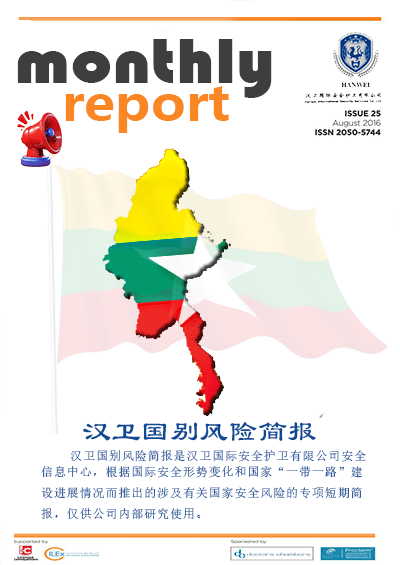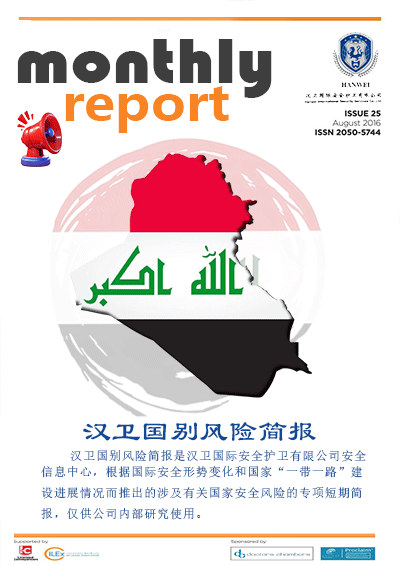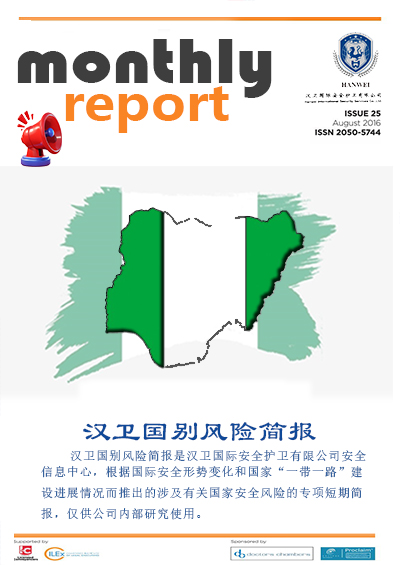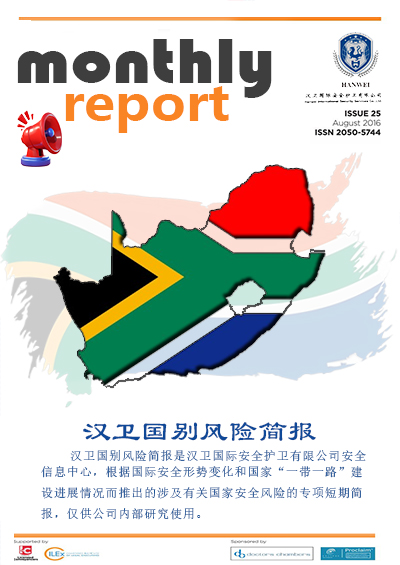Overview of the Security Situation in Iraq in January
Researcher No. 006
According to the monitoring report of the security officer of Hanwei International stationed in Iraq and related media reports, our company will focus on the overall macro security situation in Iraq this month, mainly centering on three aspects: internal social issues, external conflict threats, and threats from terrorist organizations. It can be seen that the overall situation in Iraq tends to be stable, but it still faces many potential threats.
In recent years, Chinese enterprises have shown a favorable development trend in multiple fields and in all aspects in Iraq. The annual power generation is expected to reach 780 million kilowatt-hours, which can create about 500 job opportunities for the local area. The development momentum of Chinese enterprises in Iraq should not be underestimated. However, it is still necessary to always pay attention to various potential risks within Iraq and take timely measures to prevent and respond to risks.
The first is internal social issues.This month, large-scale protests and demonstrations have erupted in some parts of Iraq due to inadequate infrastructure services, delayed wage payments, and the passage of controversial laws by the parliament, which may trigger related social security issues. On January 7th, employees of the Iraqi drilling company in Basra Province held a protest demonstration, demanding the same welfare benefits as those of other affiliated companies of the Ministry of Oil. On January 10th, Hussein al-Maliki, the president of the Basra Contractors' Federation, threatened that if the central government continued to default on debts to Basra contractors and companies, a nationwide demonstration would be held and roads leading to oil fields in the province would be blocked. On January 19th, a high-level Kurdish delegation arrived in Baghdad to seek a solution to the crisis of delayed salary payments in the Kurdish region. On January 22nd, the Iraqi women's rights organization 188 Alliance organized a demonstration in Sulaimaniyah to protest against the controversial amendment to the Personal Status Law, calling for the protection of the rights of women, children and ethnic minorities.
The second is the threat of external conflicts.
(1) The military competition between Israel and Iran.In 2024, Iran-backed Iraqi militia groups frequently launched drone and missile strikes against Israel, which led Israel to threaten to carry out large-scale attacks on targets in Iraqi mainland. The "Arc of Resistance" led by Iran has suffered a heavy blow due to the strong return of US President Trump's "maximum pressure" measures and Israel's adoption of strategies such as division and blockade. At the beginning of this month, Ismail Carney, the commander of Iran's Quds Force, made a secret visit to Baghdad. During his visit, he met with several leaders of Iraqi armed factions and instructed them to abide by the decisions of the Iraqi government. He also assured Iraqi Prime Minister Sudani that "Iran does not want to be involved in any conflict and does not want Iraq to be implicated." This visit reflects Iran's high level of concern over the regional situation and aims to coordinate positions in response to the so-called "American-Zionist" "New Middle East" plan. After Syria, Iraq or Iran may become the next key target of attacks.
(2) The deep entanglement between Turkey and the Kurdistan Workers' Party.Since the summer of 2024, Turkey has intensified its cross-border strikes against the Kurdistan Workers' Party (PKK), which may trigger a counterattack by the PKK in Iraq and subsequently affect the security situation at the Iraqi border. On January 5th, the Turkish Ministry of Defense announced that the Turkish army had eliminated a total of 36 members of the Kurdistan Workers' Party in northern Syria and northern Iraq. On January 8th, Turkey launched a fierce artillery attack on the target facilities of the Kurdistan Workers' Party in the Martin Mountains of Duhok Province, Kurdistan Region. On January 10th, more than 15 members of the Kurdistan Workers' Party and the Kurdistan People's Protection Force were eliminated in northern Syria. On January 11th, Turkish security forces eliminated a total of 11 members of the Kurdistan Workers' Party in the Hakuk, Medina and Gara regions of northern Iraq.
The third is the threat from terrorist organizations.Due to the unstable regional situation such as the regime change in Syria and the conflict between Syria and Israel, the remnants of the extremist organization "Islamic State" (ISIS) have been launching attacks from time to time in remote rural areas in western and northern Iraq. On January 6th, Iraqi security forces arrested key personnel responsible for reorganizing the ISIS undercover team in Baghdad. On January 8th, Iraqi Air Force personnel piloted F16 fighter jets to launch an air strike on ISIS target facilities in the Hamlin Mountains of Kirkuk Province, killing multiple terrorists and seizing a large amount of weapons and logistical supplies. On January 10th, Iraqi security forces launched a large-scale military operation in a strategic location between Kirkuk Province and Saladin Province. On January 12th, a total of five extremist group militants were eliminated in Anbar Province in western Iraq. On January 22nd, three militants were eliminated.
It is recommended that Chinese-funded enterprises and individuals in Iraq take special precautions:The first is to do a good job in collecting and warning information related to protests and demonstrations.This month, protests and demonstrations have occurred frequently in Iraq, seriously affecting the daily lives and business operations of people in the surrounding areas. It is recommended to closely follow local news media, social media and government announcements, etc., to obtain information about protest and demonstration activities in a timely manner, so as to make preparations in advance. During the protest and demonstration period, try to minimize unnecessary outings. If you need to go out, plan a safe route in advance and ensure your safety. Meanwhile, Chinese enterprises should strictly abide by Iraq's labor laws and regulations, etc., to avoid legal risks and safety issues caused by illegal and non-compliant behaviors.Second, pay attention to security trends and conduct thorough risk assessments.The threats of external conflicts and terrorist organizations in Iraq are mainly concentrated in the border areas of the north and west of the country. It is suggested that Chinese citizens be reminded to reasonably assess the working environment and avoid traveling to Iraq for the time being unless necessary. Among them, some extremely high-risk provinces such as Anbar, Salahuddin, Kirkuk, Nineveh and Diyala. In daily life, carry necessary identification documents with you. There are many checkpoints in Iraq. In case of illegal checks or other emergencies, contact the embassy in time. It is suggested that Chinese enterprises operating in Iraq enhance personnel security, provide important security equipment for their employees, and prevent them from going out alone, especially to remote areas or regions with poor public security. Regularly assess the security risks within the business area and adjust the security strategies and preventive measures based on the assessment results.




